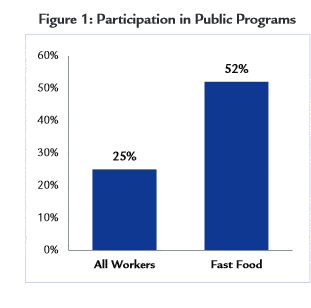A UC Berkeley study released at the end of 2013 has found that the cost of public assistance to families of workers in the fast-food industry is nearly $7 billion per year.
Nearly three-quarters (73 percent) of enrollments in America’s major public benefits programs are from working families. But many of them work in jobs that pay wages so low that their paychecks do not generate enough income to provide for life’s basic necessities. Low wages paid by employers in the fast-food industry create especially acute problems for the families of workers in this industry. Median pay for core front-line fast-food jobs is $8.69 an hour, with many jobs paying at or near the minimum wage.
Benefits are also scarce for front-line fast-food workers; an estimated 87 percent do not receive health benefits through their employer. The combination of low wages and benefits, often coupled with part-time employment, means that many of the families of fast-food workers must rely on taxpayer-funded safety net programs to make ends meet.
This report estimates the public cost of low-wage jobs in the fast-food industry. Medicaid, the Earned Income Tax Credit and the other public benefits programs discussed in this report provide a vital supportsystem for millions of Americans working in the United States’ service industries, including fast food. We analyze public program utilization by working families and estimate total average annual public benefit expenditures on the families of front-line fast-food workers for the years 2007–2011.1 For this analysis we focus on jobs held by core, front-line fast-food workers, defined as nonmanagerial workers who work at least 11 hours per week for 27 or more weeks per year.
More findings
- More than half (52 percent) of the families of front-line fast-food workers are enrolled in one or more public programs, compared to 25 percent of the workforce as a whole.
- The cost of public assistance to families of workers in the fast-food industry is nearly $7 billion per year.
- At an average of $3.9 billion per year, spending on Medicaid and the Children’s Health Insurance Program (CHIP) accounts for more than half of these costs.
- Due to low earnings, fast-food workers’ families also receive an annual average of $1.04 billion in food stamp benefits and $1.91 billion in Earned Income Tax Credit payments.
- People working in fast-food jobs are more likely to live in or near poverty.
- One in five families with a member holding a fast-food job has an income below the poverty line, and 43 percent have an income two times the federal poverty level or less.
- Even full-time hours are not enough to compensate for low wages. The families of more than half of the fast-food workers employed 40 or more hours per week are enrolled in public assistance programs.


